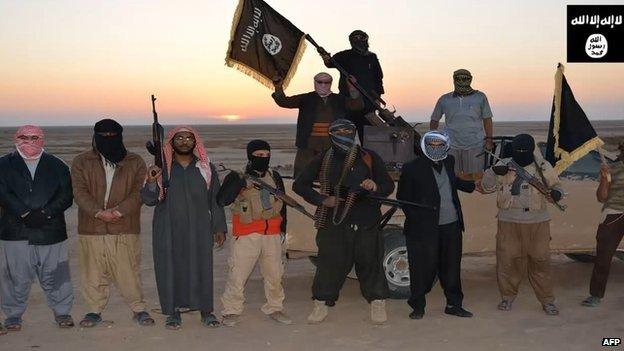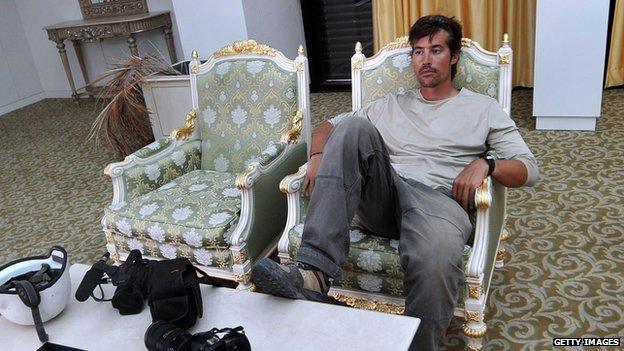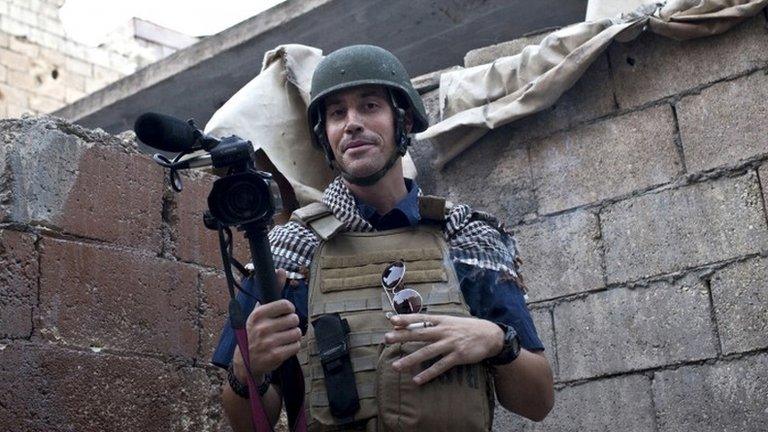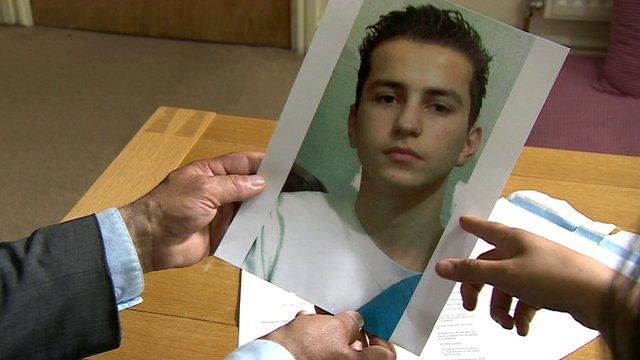Facebook, Twitter and Google to attend EU anti-extremist meeting
- Published

More than 500 Britons are believed to have travelled to Syria, where radical Islamist groups are involved in fighting
A "private" dinner between tech firms and government officials from across the EU is to take place on Wednesday.
The purpose of the meeting is to discuss ways to tackle online extremism, including better cooperation between the EU and key sites.
Twitter, Google, Microsoft and Facebook will all be attending in Luxembourg.
Governments are becoming increasingly concerned over how social media is being used as a recruitment tool by radical Islamist groups.
Further details about the meeting could be shared by the EU later on Wednesday ahead of the dinner taking place.
It will be attended by ministers from the 28 EU member states, members of the European Commission and representatives from the technology companies.
The European Commission said: "There is strong interest from the European union and the ministers of interior to enhance the dialogue with major companies from the internet industry on issues of mutual concerns related to online radicalisation."

The spread of videos and images depicting the beheading of US hostage journalist James Foley highlights the challenge facing networks
In particular, it said the meeting would focus on:
"the challenges posed by terrorists' use of the internet and possible responses: tools and techniques to respond to terrorist online activities, with particular regard to the development of specific counter-narrative initiatives"
"internet-related security challenges in the context of wider relations with major companies from the internet industry, taking account due process requirements and fundamental rights"
"ways of building trust and more transparency"
The BBC understands this is the second time since July that the firms have been called in to discuss possible measures.
However a notable absence at the meeting will be Ask.fm, a social network believed to have been extensively used as a recruitment tool for radical Islamist groups.
The firm was owned by Latvian brothers Ilja and Mark Terebin, but in August was bought by the American company behind Ask.com.
The site's new owners told the BBC: "Ask.fm has not been invited.
"If we had known about it, we would have attended for sure."
Running battles
Representing the UK government at the meeting will be security minister James Brokenshire.
"We do not tolerate the existence of online terrorist and extremist propaganda, which directly influences people who are vulnerable to radicalisation," he told the BBC.
"We already work with the internet industry to remove terrorist material hosted in the UK or overseas and continue to work with civil society groups to help them challenge those who promote extremist ideologies online. We have also made it easier for the public to report terrorist and extremist content via the gov.uk website."
The government's Counter Terrorism Internet Referral Unit (CTIRU), set up in 2010, has removed more than 49,000 - pieces of content that "encourages or glorifies acts of terrorism" - 30,000 of which were removed since December 2013.
Details on the EU dinner are sparse.
But there is increasing concern over the role social media plays in disseminating extremist propaganda, as well as being used as a direct recruitment tool.
However, there is also a significant worry that placing strict controls on social networks could actually hinder counter-terrorism efforts.
"The further underground they go, the harder it is to gleam information and intelligence," said Jim Gamble, a security consultant, and former head of the Child Exploitation and Online Protection Centre (Ceop).
"Often it is the low level intelligence that you collect that you can then aggregate which gives you an analysis of what's happening."
Mr Gamble was formerly head of counter-terrorism in Northern Ireland. There were, he said, parallels to be drawn.
"There's always a risk of becoming too radical and too fundamentalist in your approach when you're trying to suppress the views of others that you disagree with.
"In Northern Ireland, huge mistakes were made when the government tried to starve a political party of the oxygen of publicity. I would say that that radically backfired."
Recruitment
Current estimates put the number of British citizens recruited to fight for radical Islamist groups in Syria and Iraq at more than 500.
Mr Gamble said the recruitment process focused on singling out those who looked most susceptible.
"They identify the isolated, the lonely, those people who have perhaps low self-esteem, and are looking for something, or someone."
Ask.fm's site hosted several discussions regarding the practicalities of getting to Syria or Iraq.

One expert worried extremists could be driven further underground
Many of these discussions remained online for a considerable amount of time - some for several weeks.
However, in an interview with the BBC, Ask.fm said it had had few requests from governments to take such material down.
"In the past 18 months we've only received about a dozen requests from law enforcement," it said.
"Sometimes these issues are really hard to discover when you've not got the full concept of what's going on outside the social network that you run.
"We really do want to forge partnerships with law enforcement to be able to take meaningful action on this."
In a statement, a spokeswoman for the Met Police said 1,100 pieces of content that breached the Terrorism are removed each week from various online platforms - approximately 800 of these are Syria/Iraq related.
Update 09/10/14: EU commissioner Cecilia Malmström and Italian interior minister Angelino Alfano - who both hosted the dinner - have issued a statement.
It reads: "The participants discussed various possible ways of addressing the challenge. It was agreed to organise joint training and awareness-raising workshops for the representatives of the law enforcement authorities, internet industry and civil society."
Follow Dave Lee on Twitter @DaveLeeBBC, external
- Published20 August 2014

- Published24 June 2014

- Published25 June 2014
